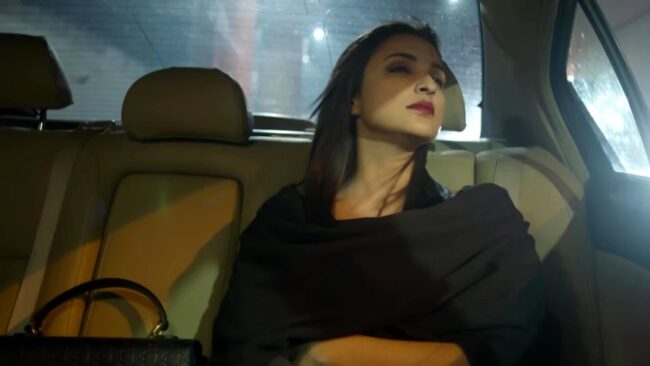It’s late at night and a SUV is driving down the road recklessly. There are three drunk men inside talking about women. The conversation is something like this: there are extremely pretty twin sisters present at a hypothetical party. One is wearing nothing on her face while the other is wearing lipstick. Which one will they take home? The front-seated guy replies he will take the one with the lipstick because she has already come with the intention of ‘wanting’ it. They laugh crassly.
They continue driving in a dangerous manner simultaneously annoying and teasing people in other cars. After some time, the discussion turns to the front-seated guy’s girlfriend who once gave him a pink shirt. His friends joke about calling him ‘Pinky.’ What kind of a name is ‘Pinky’ for a man? The man sniggers and joins in, “I am Pinky? I am Pinky? I am -” several gunshots are fired. The film opens with shattered glass and splattered blood.
The director Dibakar Banerjee‘s study of society is both sharp and layered. We are not only meant to simultaneously see and critique these couple of entitled, egotistical, obnoxious average Indian men but drive our attention to a larger domain of public space and its gendered nature.

Historically, public spaces have been the realm of men. Women are allowed to access these spaces from time to time but never really own them. They can never aimlessly linger and loiter around. Their entry into the outside world is for a purpose and are expected to straightforwardly return home, where their true destiny lies. The idea of women having fun in an open space like this is both unimaginable and a source of anxiety.
In her seminal book Why Loiter? Women and Risk on Mumbai Streets, Phadke says, “Loitering as an act is about the purposeless occupation of public space — something that precludes the possibility of creating sanitized homogeneous spaces. It is precisely this ambiguity that makes loitering potentially liberating. Loitering mocks the authority of any one group of people to determine the future of the city by speaking with multiple visceral bodies and through the indeterminate nature of the identity of the loiterer,” Thus, loitering by women will be a refusal to fit in the boxes made by society for them. It is at once a basic right and a revolutionary act.
Sandeep Aur Pinky Faraar carries a lot of subversions. On the one hand, it is a chase movie that uses the plot of the chase as a ploy to make its broad comment on a patriarchal and classist society. On the other hand, the overturn happens in the title itself. Sandeep Walia is a woman who works in the corporate world of banks and Satyendra “Pinky” Dahiya is a suspended Haryanavi police officer. Names are an important point of social identification which helps to both reveal and produce binary gender identities. The link between personal naming and one’s gender is part of gender theorist Judith Butler’s idea of “performativity.”
The essential hypothesis is how gender is not a stable identity but something that has been constituted and instituted over a period of time through the “repetition of stylized acts” until they become naturalized. Giving the huge and burly police officer a name like Pinky works at two levels. It is giving a man a woman’s name but not any other name. It is a color any man will be derided to like since its heavy association with the feminine.

The aforementioned first scene is again played but this time from the angle of Pinky who was the one teased by the three drunk men. He hurls abuses at them. Sandy, sitting behind him, is deeply disgusted and tells him to not drive while talking on the phone. Pinky murmurs something like okay but you can see the conflict. He cannot ignore her commands because of her class (she is carrying an iPhone 12 and a designer handbag) but he cannot take her seriously enough because of her gender.
The facts of the film are these: Sandeep or Sandy (Parineeti Chopra) has invented a fraudulent scheme for the bank’s customers on her boss’s demand. She is now in a feud with him and also carrying a child with him. Her boss orders officer Tyagi (Jaideep Ahlawat) to kill Sandy. Tyagi sends Pinky (Arjun Kapoor) to pick her up. Sandy and Pinky witness the three men being shot and go on a run, realizing they were the intended targets. Pinky’s Boss Tyagi and Sandeep’s boss Parichay are the very embodiments of the patriarchal system. These powerful elites reap the benefits at the expense of exploitation and oppression of the vulnerable and the marginalized. At some level, Pinky and Sandeep’s run is from this system itself.
Sexist instances are littered throughout the film, but none of it feels scripted because of its normalcy. In Banerjee’s hands, the casual occurrences become the field of study. The small moments in the film do not exist in isolation but relate to a larger setting. When Pinky doesn’t disclose to Tyagi their whereabouts, the latter concludes that Sandy has offered sex to Pinky, a weapon, as assumed by the majority, through which women can make men lose their senses. Sandy and Pinky become paying guests in the home of an uncle and aunty in Pithoragarh till they cross over to Nepal.
The uncle (Raghubir Yadav) is the typical patriarch of his family who speaks in English to strangers to prove his superiority and loathes if his wife speaks in front of them. One day his wife angrily decides to leave the house and he runs after her to say, “Do you even have a place to go?” The marriage system is in place to keep women under control. They have been “parai” since the moment they are born.

In another scene, Pinky befriends a couple of Jat boys who are diehard Salman Khan ‘Bhai’ fans. Khan is known for portraying an Alpha man on screen with big biceps whose jokes are at the expense of women. The treatment of women is the subtext of the bro code he has with his fans. You know these devotees. They will celebrate Khan for his bare minimum and his biggest faults will be only considered a temporary setback.
While the social world will have us believe in the heterosexual order, the inherent humanity does not really recognize such binarism. Within the gender role stereotypes, men cannot cry or be gentle which is the exclusive domain of women. Yet when Sandeep loses her child in the struggle to protect herself from a sexual assaulter, it is Pinky who washes her body, cleans the blood, and attempts to understand her pain. He is the same toxic man who was grappling when ordered by a woman. The performance of his manness dissolves into a simple act of humanity.
It is worth noting that the front-seated man was killed when he was mocking the name ‘Pinky’ – “I am Pinky”, he says as his hellish laughter filled up our ears. On the other hand, the one with actually the name ‘Pinky’ is saved. Hence, it is in the undoing of gender normativity and implicitly challenging its dualism lies both Pinky and Sandeep’s safety.
The subversion, which was happening only at the level of names, takes a full swing at the end. Sandeep watches Pinky put makeup on his face and wears a pink sari. Pinky observes Sandeep put on a dark-colored jacket, hoodie, and boots. By the end, Pinky dances away in the baarat in a sari to Nepal and Sandeep goes out to confront the world. While they are escaping death, they are actually practicing freedom.
Watch Sandeep aur Pinky farar on Amazon prime video!
